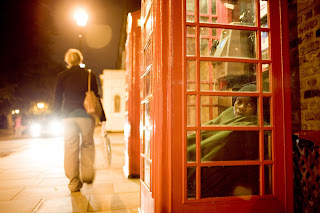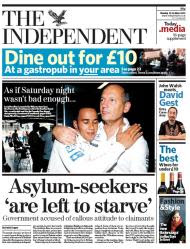"even a dog is treated better"

Refugees and asylum seekers made destitute through delays with the asylum system or having their cases rejected described their lives yesterday at a hearing in Manchester.
Men and women from Iran, Afghanistan, Pakistan, Somalia, Sudan, Democratic Republic of Congo, Zimbabwe, Uganda and Ethiopia were among those who spoke at the Independent Asylum Commission session, which focused on the issue of destitution.
Financial support, housing and access to free healthcare are withdrawn when an asylum seeker's case is rejected - even when an appeal is pending. With no money and no legal right to work, many end up destitute - living on the streets or on people's floors, and reliant on charities and faith groups. Many who end up in this situation are eventually granted leave to remain.
There are known to be upwards of 1,000 destitute refused asylum seekers in Greater Manchester alone, but they are an invisible population that few are aware of - including many politicians. Campaigners, including the support agency Refugee Action, believe government uses destitution as a deliberate tactic aimed at forcing them to go home.
The problem is that many would rather live with nothing in this country than face persecution and torture back home.
There was some harrowing testimony at the hearing, part of a national citizens' enquiry into the system. The Commission's report, out next year, will make recommendations for how the UK asylum system can be made fair and humane as well as effective.
- Selam, a refugee from Ethiopia told how she went through seven different solicitors, was detained and then made destitute after her appeal notification was sent to the wrong address in Bolton. She was finally granted refugee status in June – five years after her arrival. “I was always moving around, sleeping on my friends’ floors and sofas, and spent my days just walking, with nowhere to go,” she said. “I could get parcels of food and a small amount of money from a Red Cross drop-in. I have no words to explain what life was like for me. It was a miserable time.”
- Mary, from Uganda, told how she was imprisoned, beaten and repeatedly raped after a relative was discovered to have joined a rebel faction, but fled alone to Britain in 2003. In 2005, her asylum claim was rejected and she was turned out of her accommodation in Manchester and her benefits stopped. "It is worse than being an animal," she said. "I rely on the Red Cross for food and have to sleep on people’s floors. Even a dog is treated better. I am educated and have a brain but am not allowed to work. I cry every day. I am terrified for the future.”
- A 70-year-old Somalian woman who speaks no English and suffers from arthritis and a gastric condition slept on friends’ floors and sofas and lived on vouchers for nine months while her case was processed.
- A 47-year-old torture survivor from Dafur told how slept at Manchester’s train and tram stations and in subways after being told to return to Sudan. His asylum case was eventually accepted.
- Flores Sukula, 21, from the DRC, described how eight members of her family - including her six-month-old sister - were left destitute in Bolton after their case was rejected. They were left with £30 a week to survive on. This year the family made a fresh application and their support was restarted. They are still waiting for the outcome. Flores said: "I didn't feel like a human being. They treat animals better than we were treated. My dad just wanted to work so we could take care of ourselves."
- And a Zimbabwean teacher - who quit her homeland after being forced to work as an election monitor during rigged polls - broke down in tears as she told how immigration officers broke down her door in the early hours of one morning, hand-cuffed her and dragged her half-dressed into their vehicle. She spent several weeks in detention before finally being released.
Dave Smith, of Manchester's Boaz Trust, whose members put up destitute people in their own homes, told how he had known nine-months-pregnant women to be released from jail and onto the streets. Boaz is currently housing 28 people, but has more than 170 more on its waiting list. Desperate people have walked all the way from Wigan to Manchester (about 20 miles) in order to pick up food parcels.
Ruth Heatley, solicitor with Greater Manchester Immigration Aid Unit, said she knew of whole families subsisting on £38 a week of state benefits. She added that it was unlikely that destitute asylum seekers would access emergency support in the form of food vouchers without proper legal representation - but the number of lawyers doing immigration has plummeted due to changes in the funding system.
Nigel Rose, manager of Refugee Action Manchester, does not call for an amnesty or an open borders policy. All he wants is for refugees and asylum seekers to be treated with dignity and given some support, until their case is fully dealt with.
“Far from encouraging refused asylum seekers to return home, destitution has the opposite effect. It means the government loses contact with asylum seekers, who enter a cycle of poverty, fear, hunger and mental and physical deterioration. Each day they are destitute, the chances of return become more remote,” he said.
“Instead, the government should maintain contact with refused asylum seekers and work with them to resolve their cases.”
postscript: The MEN's story on it...the misplaced apostrophe in the headline is nothing to do with me though. No doubt there'll be some vicious comments under that story by later today.
pps
The Independent splashed on this story today...better late than never, I guess
